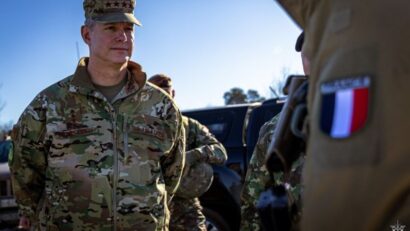The NATO Battle Group in Romania, a bastion of the Allied Eastern Flank
Romania hosts one of the eight permanent multinational battle groups of the North Atlantic Alliance deployed in the eastern part of its territory.

Lăcrămioara Simion, 14.05.2025, 14:00
Romania hosts one of the eight permanent multinational battle groups of the North Atlantic Alliance deployed in the eastern part of its territory. The NATO Battle Group Enhanced Forward Presence was established three years ago and is sized at the level of a battalion, but is designed to expand, if necessary, to the level of a brigade. Its base is located at the National Joint Training Center in Cincu, Brașov County (central Romania). The group is led by France, and alongside the French troops in Romania, soldiers from Belgium, the Netherlands, Luxembourg and Spain are deployed, on a rotational basis.
Lieutenant Colonel Christophe Bellefroid is an officer in the Belgian army and he believes that joint training and getting to know the terrain are very important for allied military operations: “We are currently carrying out missions in different areas of Romania and we are training together with the Romanian army, which is very interesting from our point of view because we have the opportunity to exchange experiences and learn from their knowledge and, especially, from the missions they participated in, because if we have to operate in this area it is important for us to learn from the Romanian army. We prepared before participating in this mission together with the French soldiers who are also present here and also with our colleagues from Luxembourg.” Said Lieutenant Colonel Christophe Bellefroid.
For about half a year, a detachment of the Spanish army has also been part of the NATO Battle Group in Romania. Their specialization is marine infantry, and during this time they have trained in almost all the training grounds in our country, as we learned from Major Alejandro Caballero Minaca: “We had a very good experience here. This is the first time that Spanish marines are deployed here, within the battle group. It is really great for us. We also participated in missions in the Smârdan training ground (eastern Romania) and also on the training grounds in Cincu, so we have the chance to get to know almost all the training facilities here, in Romania.”
The command of the NATO Battle Group in Romania is held by the French Colonel Thierry Denechaud. He believes that joint exercises and training are essential for the success of the Alliance’s mission in this region: “We do training exercises at battalion level, both with other allies who are in Romania and with the Romanian army. We are part of the NATO structure in Eastern Europe and we are here to deter any aggressive action from the east and to defend this part of Europe. That is why all these exercises take place, because it is very important to understand each other and also, in the end, to be able to conduct missions together.”
NATO’s motto “Stronger Together” emphasizes the importance of the collective strength of the North Atlantic Alliance, something that Lieutenant Colonel Bellefroid also confirmed: “The Alliance is stronger together, it is able to cooperate, and that is why these trainings are taking place, in which the detachments of the nations present here in Romania participate. We also have to periodically adapt to different situations in order to be able to protect this eastern flank and protect the Romanian people.”
Adaptation of tactics and procedures, interoperability between allied forces, joint training are absolutely necessary for multinational structures, such as the NATO Battle Group in Romania. “It is very important to train together, because if something happens, we will go together to defend that country, so we must know each other, know the tactics, techniques and procedures of all the forces and be able to fight together if necessary. Spain is committed to defending countries throughout the Alliance, that is why we are here at this moment, because the security of Romania is also the security of Spain and all the other countries that belong to NATO,” concludes Major Alejandro Caballero. (Adrian Gîtman) (trad.LS)






























